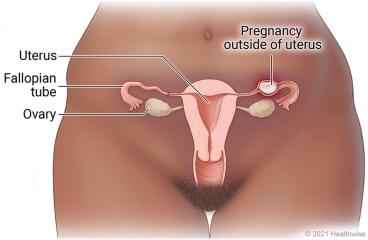
Overview
Your doctor thinks you may have an ectopic pregnancy. This means that a fertilized egg has attached to a place outside the uterus. In most of these cases, the egg grows in a fallopian tube. This is also called a tubal pregnancy. In rare cases, the egg grows in an ovary or another place in the belly.
An ectopic pregnancy cannot develop normally. It can be painful and very dangerous. Sometimes an ectopic pregnancy stops on its own and the body absorbs it over time. But if it doesn't, you will need treatment.
You may have expectant management. This means your doctor monitors your pregnancy hormone levels to check if they are dropping on their own. Or you may have treatment right away. But it may or may not be legal to treat a suspected ectopic pregnancy where you live. In some places the diagnosis of an ectopic pregnancy must be certain before treatment can be started. Talk to your doctor about your options.
The doctor has checked you carefully. But you may need to come back for more tests. Problems can develop later. Watch carefully for belly pain or bleeding. Call your doctor right away if you have any new or increased pain or bleeding. If you have other symptoms, such as shoulder pain, dizziness, lightheadedness, or fainting, get medical care right away. These could be signs of internal bleeding.
Follow-up care is a key part of your treatment and safety. Be sure to make and go to all appointments, and call your doctor if you are having problems. It's also a good idea to know your test results and keep a list of the medicines you take.
How can you care for yourself at home?
- Rest when you feel tired. You may be more tired than normal for a few weeks.
- Avoid moving quickly or lifting anything heavy until your doctor tells you it is safe to do your normal activities.
- Ask your doctor when you can have vaginal sex again.
- Your doctor might want you to use sanitary pads if you have vaginal bleeding. Using pads makes it easier to keep track of your bleeding.
- If you are treated with methotrexate:
- Follow your doctor's instructions about taking over-the-counter pain medicine, such as acetaminophen. Don't take nonsteroidal anti-inflammatory drugs (NSAIDs) like ibuprofen or naproxen. Read and follow all instructions on the label.
- Do not take two or more pain medicines at the same time unless the doctor told you to. Many pain medicines have acetaminophen, which is Tylenol. Too much acetaminophen (Tylenol) can be harmful.
- Do not drink alcohol.
- Do not take vitamins that contain folic acid, such as prenatal vitamins.
- Avoid direct sunlight. It can cause skin problems while methotrexate is in your body.
- Avoid foods that may give you gas, such as beans, broccoli, cabbage, and apples.
- Pay attention to your feelings. If you're sad and it's not getting any easier, talk with your doctor or a counselor.
- Talk to your doctor if you want to try to get pregnant soon. The doctor can tell you when it's safe to do so.
- If you don't want to get pregnant, ask your doctor about birth control. It's possible to get pregnant again before your next period starts.
- Go to all follow-up appointments and tests. This helps your doctor make sure that your pregnancy hormone levels are dropping.
When should you call for help?
Call 911 anytime you think you may need emergency care. For example, call if:
- You have sudden, severe pain in your belly or pelvis.
- You passed out (lost consciousness).
- You have severe vaginal bleeding. This means that you are soaking through a pad each hour for 2 or more hours.
Call your doctor now or seek immediate medical care if:
- You are dizzy or lightheaded, or you feel like you may faint.
- You have new or increased pain in your belly or pelvis.
- Your vaginal bleeding is getting worse.
- You have increased pain in the vaginal area.
- You have new pain in your shoulder.
- You have a fever.
Watch closely for changes in your health, and be sure to contact your doctor if:
- You do not get better as expected.
Where can you learn more?
Go to http://www.healthwise.net/patientEd
Enter W428 in the search box to learn more about "Suspected Ectopic Pregnancy: Care Instructions".
Current as of: July 15, 2025
Author: Ignite Healthwise, LLC Staff
Clinical Review Board
All Ignite Healthwise, LLC education is reviewed by a team that includes physicians, nurses, advanced practitioners, registered dieticians, and other healthcare professionals.

